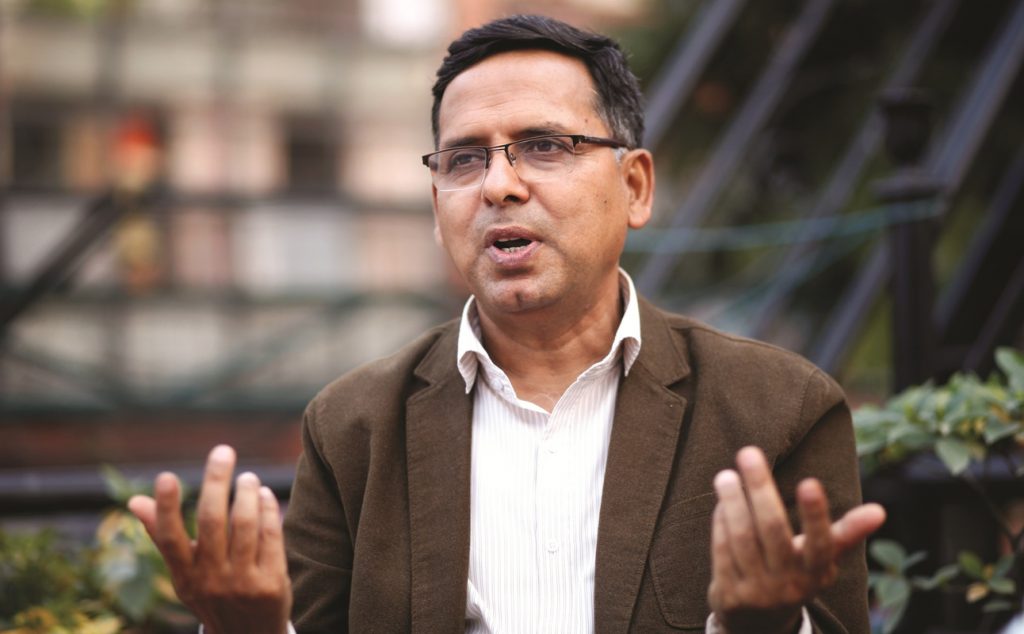As soon as the hearing of the writ petition filed in the Supreme Court against the dissolution of the House of Representatives began in the Constitutional Court, a dispute has started over the formation of the bench.
After the legal practitioners of the writ petition side started a dispute over the formation of the bench, the hearing could not be started focusing on the issue.
The controversy over the composition of the Constitutional Court began on Sunday with the hearing of Chief Justice Cholendra Shamsher Jabara, Justices Deepak Kumar Karki, Dr. Ananda Mohan Bhattarai, Tej Bahadur K.C. and Bam Bahadur Shrestha.
Stating that Judge K.C. had also participated in the hearing of the case against the dissolution of the House of Representatives in the dispute over the composition of the bench and that Shrestha had ruled in the dispute over the name of the CPN, the lawyer of the writ petitioner argued that he should not sit in the bench.
Advocate Govinda Sharma had raised the question that Judge K.C., who was the CPN verdict as soon as the hearing started, should not sit in the bench. The practice has not been seen in the history of the world.
Constitutionalist Dr. Bipin Adhikari said that the practice of choosing a judge by a quarrelsome lawyer has not been seen in the world. “A litigant or a lawyer dies not have to choose a judge. Some judges may have a problem,” he said. Not even at the international level.”
According to him, judges are not everything in themselves. While adjudicating the case the constitution, the law, the petition filed by the respondent are included. He has a lawyer. In such large cases, the court gives an opinion for the independent opinion of the bar or the apex court.
If a judge has not done justice properly or made a quality decision, it is legal to impeach a judge. “The judge I choose, whether I have to argue in front of the judge I have chosen or not, is a bad precedent in this case, “he said, adding, is the process complete?”
There is a Judicial Council to see if a judge makes a fatal decision in a case according to the constitution or the law. There is a legal provision to prosecute a judge who has been found to have committed an even greater error. “It is not good to make such a demand in the Constitutional Court,” said Dr. Adhikari, a constitutionalist.” This is a constitutional dispute in the Constitutional Court.
Advocate Madhav Kumar Basnet is also of the view that the dispute over the formation of a constitutional bench is not right. “It is not up to the lawyer to change the judge in the courtroom,” he said. ” The person who registered the case should file a petition with reasons for the judge to leave the courtroom.
Earlier, Judge Harikrishna Karki left the bench after a dispute arose over the formation of a constitutional bench on the issue of dissolution of the House of Representatives. This time too, a dispute has started over the formation of a new session. “In our country there is a court case, and it is customary for a judge to leave the bench, which is not true,” Basnet said.
The lawyer of the party will not leave tge court saying: Judge
After questions were raised against Justices K.C. and Shrestha in the dispute over the dissolution of the House of Representatives, Chief Justice Jabara, had given discretionary power to sit or leave the bench. They have informed the Chief Justice that they will not leave the bench on the ground that the writ petitioner’s side will leave the bench.
Advocate Govinda Sharma, who was not allowed to sit in the bench, had questioned the decision of the CPN as soon as the hearing began. Stating that Judge K.C. had also participated in the hearing of the case against the dissolution of the House of Representatives in the dispute over the composition of the bench and that Shrestha had ruled in the dispute over the name of the CPN, the lawyer of the writ petitioners argued that they should not sit in the bench.
In particular, senior advocate Shambhu Thapa and advocate Tikaram Bhattarai have questioned the two judges. This practice has not been seen in the history of the world till today.
The Constitution of Nepal provides that five judges appointed by the Chief Justice, including the Chief Justice, shall be appointed to the Constitutional Court. The writ petitioner is now questioning the judge of the bench against the legal system. If so, a new judge must be appointed to hear each case, which is not possible, argues the constitutionalist official.
The dispute is set to be heard today. The writ petition against the dissolution of the House of Representatives has not been heard on Sunday.
All 30 writ petitions in the dispute have been filed. Outgoing members of the House of Representatives, including 146 writ petitions, are in favour of reconstituting Parliament Advocates Dhanjit Basnet, Krishna Bhandari, Rajaram Ghimire and others had filed four separate writ petitions demanding re-appointment of Prime Minister Oli, who had presented his majority in the House of Representatives.
The writ petition seeking re-appointment of Prime Minister Oli as Prime Minister and holding of timely elections does not provide a basis for a vote of confidence in the House of Representatives under Article 76(5) of the Constitutional of Nepal. The opposite is mentioned.
Congress president Sher Bahadur Deuba, CPN (Maoist Center) president Pushpa Kamal Dahal ‘Prachanda’, then CPN(UML) leader Madhav Kumar Nepal, Janata Samajwadi Party Nepal president Upendra Yadav and Rastriya Janamorcha’s Durga Poudel were among the 146 incumbents who re-established the House of Representatives. The have demanded that Deuba be made the Prime Minister.
The petition seeks to overturn the May 22 decision of the President to dissolve the House of Representatives on the recommendation of the Council of Ministers on May 22 and declare mid-term elections on November 2 and November 19 unconstitutional and illigal.
By Muna Chand



